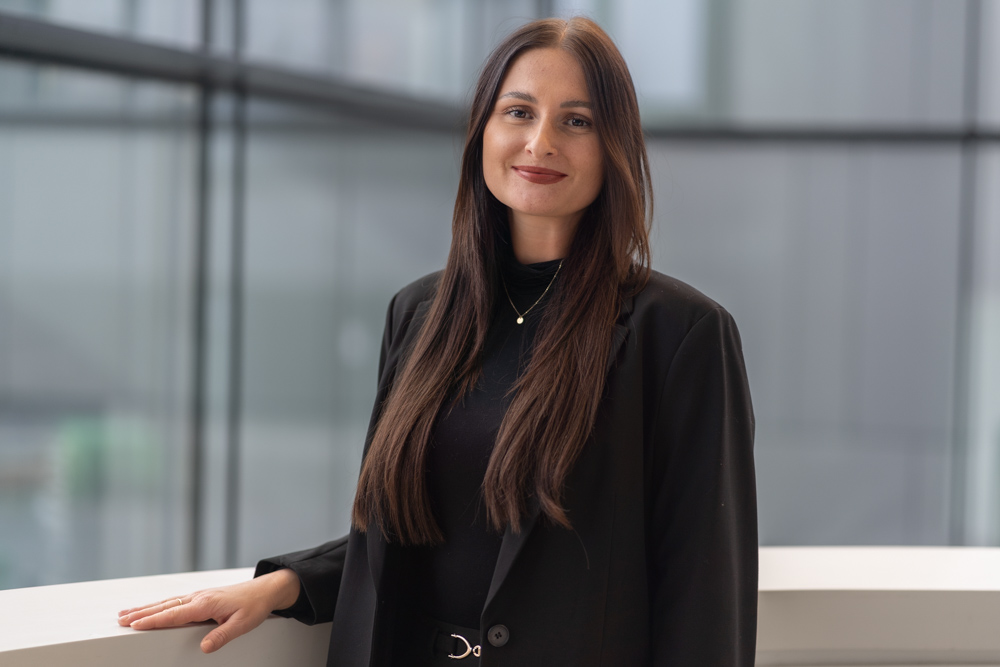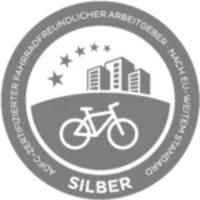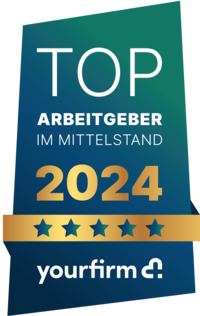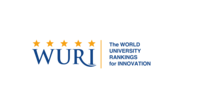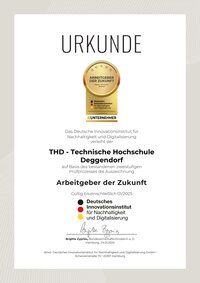Modern bioengineering research combines innovative approaches to protein synthesis, cell and tissue culture with application-orientated scaling for industrial use. Opened in 2024, the Transformation Lab is an innovative bioengineering laboratory dedicated to the development of sustainable biotechnological solutions. Our focus is on the development and optimisation of new biotechnological processes for the sustainable production of socio-economically significant biomaterials. A central area of our work is protein synthesis in cell-based and cell-free systems, with a particular focus on high efficiency, reproducibility and scalability. Cell and tissue cultures serve not only as a platform for the production of functional proteins, but also as models for researching biocompatible materials. Another key objective is the scaling of biotechnological processes for industrial applications. Methods are being developed to transfer laboratory systems to small and large-scale production processes, with a particular focus on sustainability, resource efficiency and economic viability. The close link between research and market application enables the development of new biomaterial-based solutions that can be used in medical technology, agriculture and other high-tech sectors. Our research contributes to the development of environmentally friendly, biodegradable materials, thus supporting sustainable production methods in biotechnology. We are looking for talented professionals with experience in these fields who are interested in developing innovative bioengineering approaches for real-world applications with high socio-economic impact. To expand our team, we are looking for committed scientists with experience in biotechnology, bioengineering, protein synthesis or related disciplines.
main tasks
In this position, you will be responsible for the establishment of bioprocesses and for the development and optimisation of processes in the area of protein synthesis in cell-based and cell-free systems. You will also work with cell and tissue culture models to research and produce biocompatible materials.
Another focus of your work will be the scaling of biotechnological processes for industrial application, with a focus on sustainability and resource efficiency. You will work with a wide range of biochemical protein methods, including western blot, electrophoresis, protein purification, protein quantification and immunoprecipitation. You will also cultivate cells and tissue and carry out cell biology experiments.
In the field of molecular biology, you will apply methods such as nanoparticle tracking analysis, the isolation of DNA and RNA, cDNA synthesis, as well as (q)PCR, cloning and fluorescence microscopy. The scientific processing of your experiments and the analysis and documentation of the results obtained are also part of your remit. You will also present and publish the results of your research.
In addition, you will supervise and guide students at bachelor's and master's level as well as doctoral candidates and promote their academic development. You will work actively in interdisciplinary research and development teams on the market launch of new biomaterials and thus make an important contribution to innovation in this field.
your profile
You have a university degree (master's/Diplom) and a doctorate in biochemistry, bioengineering, molecular and cell biology or a comparable field.
You have strong expertise in both fundamental and applied research, supported by an international reputation demonstrated through publications, patents, books and conference contributions. You also bring solid experience in bioanalytical chemistry, along with practical expertise in protein synthesis, cell and tissue culture, proteomics and genomics.
Your expertise includes electrophoresis, microscopy, cell culture, protein analysis, and various micro- and molecular biological techniques, and you also have a track record of working on international projects and collaborating within international research teams.
Experience with biotechnological scaling and industrial application of laboratory processes as well as enthusiasm for experimental work and a keen interest in the scientific development of sustainable biomaterials and innovative biotechnological solutions is an advantage.
Experience in acquiring third-party funding for scientific projects is also desirable.
Very good written and spoken English skills (C2) are required – good German skills are an advantage.
An independent and team-oriented approach, analytical thinking, a high level of commitment, team and communication skills, structured work, sociability, organisational skills and the willingness to travel round out your profile.
In principle, this position can also be filled as a part-time position. It is remunerated according to the collective bargaining agreement TV-L and allocated pay group E13 TV-L if the recruitment requirements are met.
The position is suitable for severely disabled persons. Severely disabled applicants will be given preference if they essentially have equal qualifications, expertise and professional performance.
For candidates holding foreign university degrees it is mandatory to submit a certificate evaluation from the Central Office for Foreign Education (Zentralstelle für ausländisches Bildungswesen, ZAB) in the course of the recruitment procedure for final evaluation of the recruitment requirements (https://zab.kmk.org/de/zeugnisbewertung).
If you feel that this position at Deggendorf Institute of Technology is right for you, we look forward to receiving your comprehensive application containing the usual documents (curriculum vitae, certificates, documentation of your career development, and at least three relevant subject-related references) via our application management at www.th-deg.de/stellenangebote.
our benefits
Relocation Support
![]()
Welcome event for all new employees. Exclusive access to DIT Career Service’s partner & family support programme, including personal assistance for relocation and job opportunities.
On-Site Facilities
![]()
Unlimited use of libraries and learning facilities. Free on site staff parking. Subsidised pre-school childcare centre at the main campus in Deggendorf. Budget friendly options in campus cafes and canteens.
Flexibility & Freedom
![]()
Flexible working hours. Freedom to work partially from home. Opportunity to apply for short term work in other EU universities via Erasmus mobility programme.
Perks & Conditions
![]()
40 hour week + 30 days annual leave + 13 public holidays. Regulated state wages with regular rise. Amazing corporate benefits. Company pension scheme. Elected staff council represent employees’ interests.
Health & Sport
![]()
Sport, excercise and nutrition promotion: free university sports clubs, limited staff excercise during working hours, annual opportunity to earn the German Sports Badge, low calorie, vegan and vegetarian options in campus canteens.
Family Friendliness
![]()
Family leave policies include maternity, paternity and adoption leave. Maternity protection is 6 weeks before to 8 weeks after the birth. Each parent is entitled to 3 years parental leave which can be taken alternately or simultaneously.
Expertise from 3 universities
If you decide to do a doctorate at DIT, the Doctoral Centre gives you access to three universities with excellent practical research and research-strong supervisors from various fields.
Structured Doctorate
![]()
You benefit from a proactive and supportive approach to various aspects of the doctoral project. The successfully completed courseswill strengthen your professional and social skills.
life and work at dit
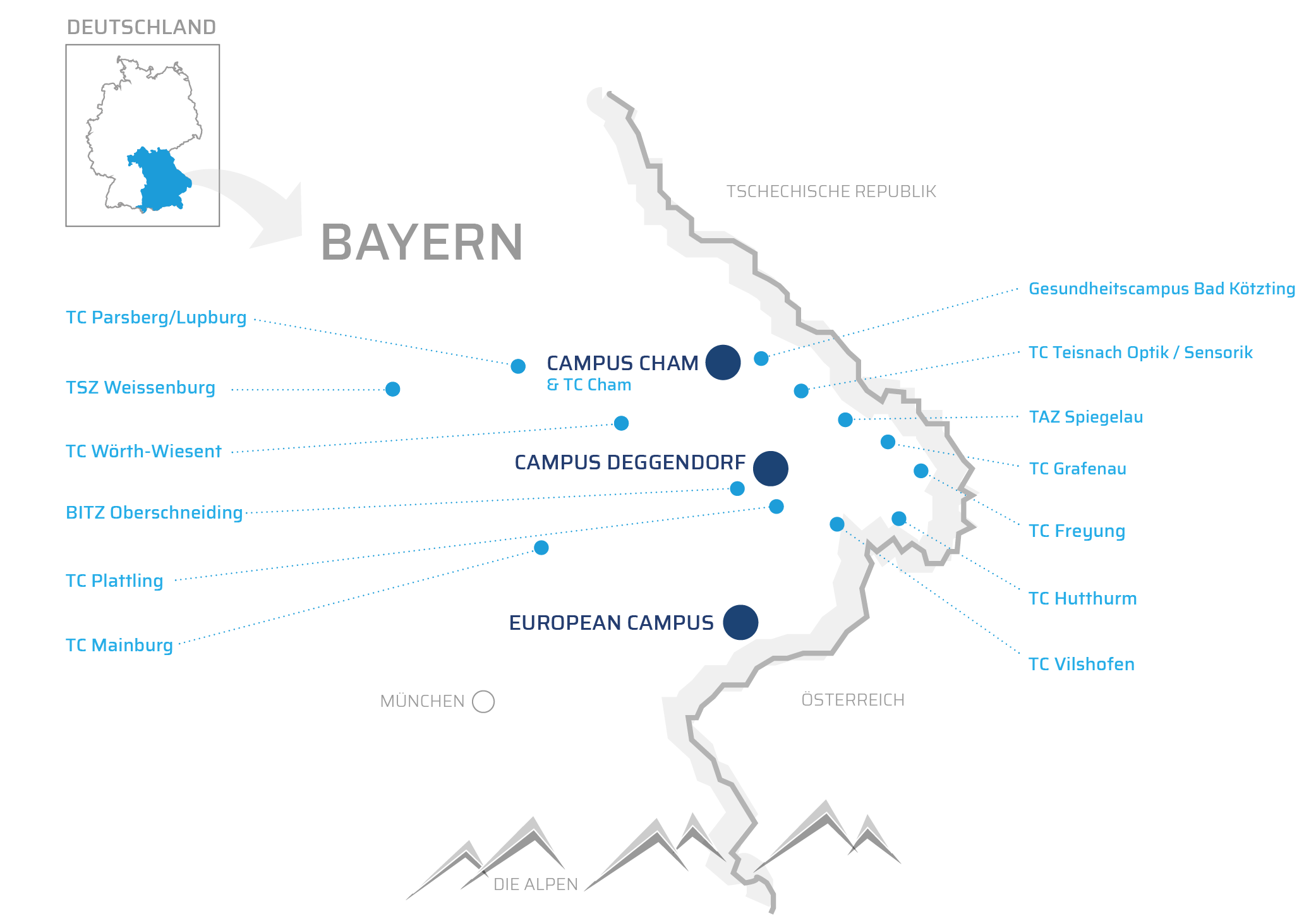
Your work environment
Focus on research
The Deggendorf Institute of Technology is one of the most dynamic and ambitious Universities of Applied Sciences in Southern Germany renowned for excellence in research. R&D projects are always rooted in real-life cases, as research staff collaborate with regional and international companies from the private sector to develop innovative solutions for immediate application, mainly funded by national government and EU grants.
For example, between January and April 2023, 27 applications for research funds were approved by the local government, supplying our professors and scientists with the financial backing to work on R&D projects. To further support these projects, professors are granted teaching-free semesters to focus on research work.
Our own facilities provide an ideal environment for applied research and teaching: 3 teaching campuses in Deggendorf, Cham and Pfarrkirchen plus 13 innovation and technology campuses equipped with the best facilities to specialise in a particular field (as depicted) are dotted in a network around the region. Research projects are generally categorised into four main areas: Digitalisation, Sustainability, Intelligent Mobility and Health Sciences.
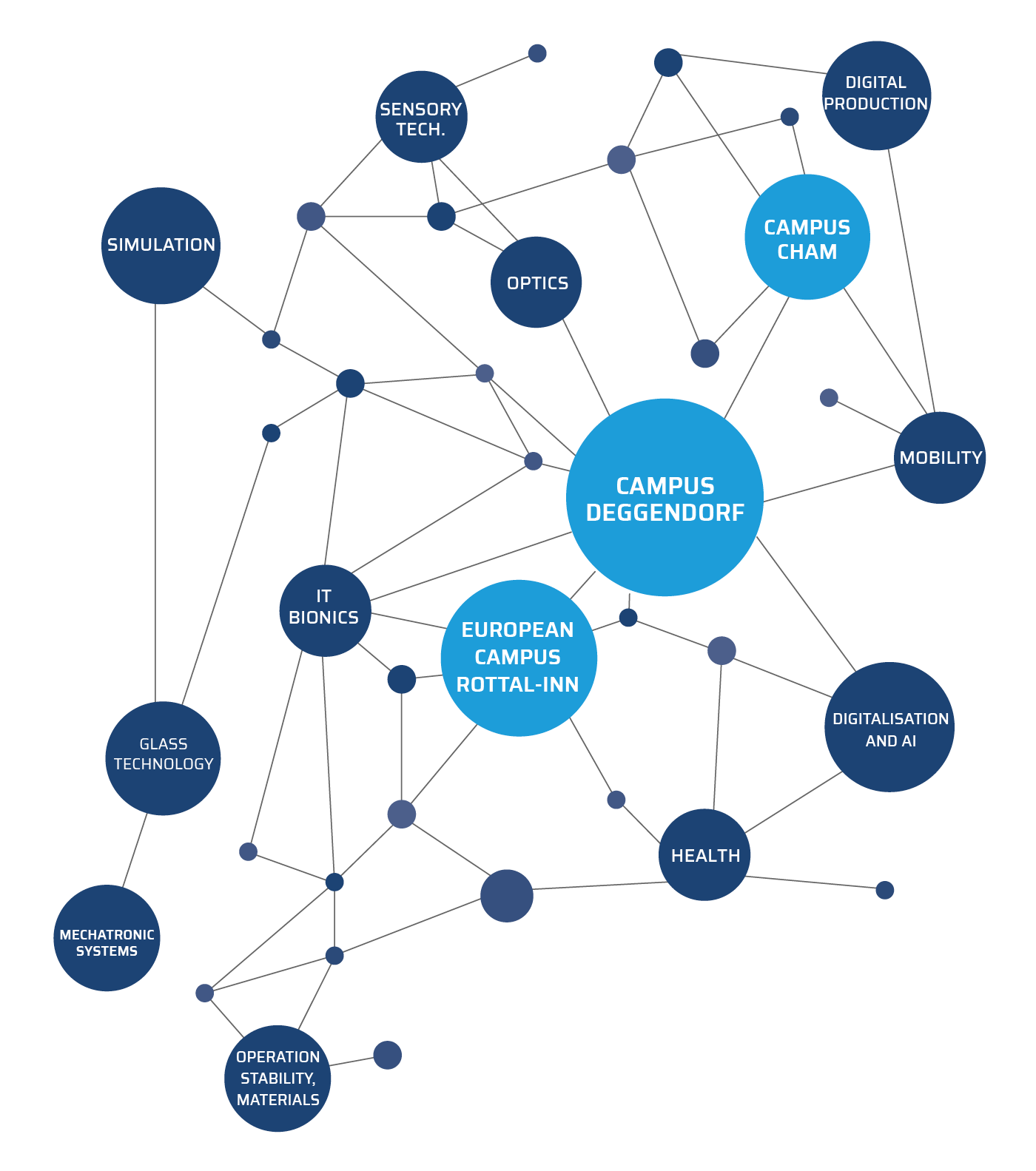
Your application
If you are interested in a position at the Deggendorf Institute of Technology, we look forward to receiving your application with the usual documents (CV, certificates, proof of professional background and the relevant subject-related references) via the "Apply now" button.
Our HRM team will be happy to answer any questions you may have about the application process. You are also welcome to network with us via LinkedIn!
